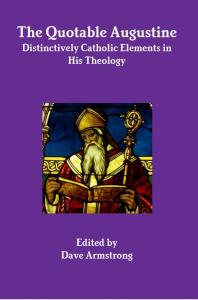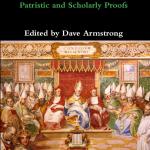Protestant anti-Catholic polemicist James Swan has been on an “Augustine & Peter” kick lately, having produced three lengthy treatises on the topic (though he carefully and conveniently avoids key factors, as I will show). He misses the forest for the trees, and demonstrates once again that he has a dim understanding of both the Catholic view on the “required” exegesis of biblical texts and Augustine’s view of the papacy. His words will be in blue.
*****
Swan’s first tome was: Augustine: “Among these [apostles] Peter alone almost everywhere deserved to represent the whole Church.” (4-4-22). He cited St. Augustine and then opined:
This quote was the first in a cumulative case meant to establish the historical pedigree of the modern Roman Catholic papacy. Out of curiosity, I did a cursory search to see the quote in context. what I discovered was that it did not establish the historical pedigree of the modern Roman Catholic papacy.
At least one of the questions on his mind, then, was whether various things Augustine wrote substantiate the notion that there is such a thing as an historically continuous papacy, starting with Peter. He studiously avoided (in all three articles) directly dealing with this question as regards Augustine’s own opinion (which is easy enough to establish); instead choosing to major on the minors.
Typically, he did extensive research into the context of this particular quote. That’s neither here nor there, and he accomplishes little here, but it must be realized that such efforts on his part are always undertaken with the implicit insinuation that Catholic presentations of patristic quotations are dishonest (either out of ignorance — incompetence — or deliberation). Swan set forth his “Conclusion”:
The specific thing I looked for when I read the sermon was anything explicit from Augustine indicating Peter was “the rock” the church was founded on, that Peter had been given charism of infallibility, that papal succession over the universal church began with Peter, etc. I didn’t find any of these concepts in the sermon. Certainly, Augustine notes Peter’s preeminence in the Biblical record (“first among the apostles”), but this does [not] substantiate the modern Roman Catholic historical papal claims. Perhaps knee-jerk Protestants think that Peter was just some guy among the myriad of first century Christians, but I do recognize that Peter was a main and important apostle. That’s much different though than reading an infallible papacy back into the historical record! [my italics added]
Note that he thinks there is no such thing as papal succession and insinuates that St. Augustine doesn’t believe in it. He seems to think that St. Augustine would deny that 1) Peter was the first pope, and 2) that this line of popes of which Peter was the first, was historically continuous. In other words, it’s the same tired and absurd line that Augustine was supposedly more Protestant than Catholic: including with regard to ecclesiology.
More interesting than this article was the exchange in the combox that ensued. One “John Q Public”: who appears to be Catholic (fortunately, he is not banned over there, as I am), made a dead-on comment:
This quote from St. Augustine is cited because it makes clear Augustine thought Peter special, first among the Apostles. You’re not refuting that’s what Augustine says or that he’s right to say this.
What you actually deny is only implicit in your argument, and it’s not addressed one way or the other by the quote from St. Augustine. You’re eliding the historical question: was Peter the first Pope? You have left unstated your assumption that, even assuming Peter was the first Bishop of Rome, he did not in fact have any sort of special authority or charism that would result in him being called Pope.
But Catholic apologists are not quoting this to prove the second part of the argument, but only the first, which part you don’t actually deny. So it’s not clear why you wrote this post.
And here is how Swan responded:
For the sake of “clarity”-
…the person I was interacting with that put forth the quote stated, “Let us look at [the ECF’s] viewpoint on the Papacy for example.” The hyperlink to this person’s words is found as the very first word of this blog entry.
…or… note the from the North American Papacy, Catholic Answers: “Did the early Church recognize a papacy? See for yourself. A collection of quotes from early Christians and Church Fathers recognizing the primacy of Peter among the apostles.”
Rome’s defenders often equate Peter’s prominence in the Bible as a proof for the papacy.
Note how Swan studiously avoided what John was suggesting. And it’s always a possibility that he didn’t comprehend or follow his reasoning. I’ve been dealing with Swan for nearly twenty years now (off and on). All of this is par for the course.
In any event, here is the compelling evidence from St. Augustine (utterly ignored by Swan), showing that he did indeed regard Peter as the first pope and the first of a line of succession:
The succession of priests keeps me, beginning from the very seat of the Apostle Peter, to whom the Lord, after His resurrection, gave it in charge to feed His sheep, down to the present episcopate. (Against the Fundamental Epistle of Manichaeus [Contra epistulam quam vocant fundamenti, 397], 4, 5)
But that after this sin Peter should become a pastor of the Church was no more improper than that Moses, after smiting the Egyptian, should become the leader of the congregation. (Against Faustus the Manichee [Contra Faustum Manichaeum, 397-398], xxii, 70)
For if the lineal succession of bishops is to be taken into account, with how much more certainty and benefit to the Church do we reckon back till we reach Peter himself, to whom, as bearing in a figure the whole Church, the Lord said: “Upon this rock will I build my Church, and the gates of hell shall not prevail against it!” [Matthew 16:18] The successor of Peter was Linus, and his successors in unbroken continuity were these:— Clement, Anacletus, Evaristus, Alexander, Sixtus, Telesphorus, Iginus, Anicetus, Pius, Soter, Eleutherius, Victor, Zephirinus, Calixtus, Urbanus, Pontianus, Antherus, Fabianus, Cornelius, Lucius, Stephanus, Xystus, Dionysius, Felix, Eutychianus, Gaius, Marcellinus, Marcellus, Eusebius, Miltiades, Sylvester, Marcus, Julius, Liberius, Damasus, and Siricius, whose successor is the present Bishop Anastasius. In this order of succession no Donatist bishop is found. (Letters [Epistulae, 386-429],53 [1, 2]: from Augustine, Fortunatus, and Alypius to Generosus [400] )
. . . that order of bishops, reaching from Peter himself to Anastasius, who now occupies that see . . . (Letters [Epistulae, 386-429],53 [1, 3]: from Augustine, Fortunatus, and Alypius to Generosus [400] )
For who can be ignorant that the primacy of his apostleship is to be preferred to any episcopate whatever? But, granting the difference in the dignity of their sees, yet they have the same glory in their martyrdom. (On Baptism, Against the Donatists [De baptismo, 400 / 401], ii, 1, 2)
Swan’s second article is entitled, “What Was Augustine “Retracting” on Peter, The Rock, and Mathew 16?” (4-12-22). Here he notes that St. Augustine earlier in his life taught that Jesus called Peter himself “the Rock” and later in his life favored the view that “the Rock” Jesus referred to was Himself and not Peter. He correctly noted that Augustine, in his late book Retractationes was tolerant of Catholics holding either view that he himself held at various times.
He is obviously under the mistaken impression (manifest throughout this article) that Catholics are supposedly formally bound to one interpretation only of Matthew 16, so that it is supposedly scandalous and significant that St. Augustine (later in life) did not hold that Peter was the Rock, which we apologists note is a position now held by many prominent Protestant exegetes (like, e.g., R. T. France and D. A. Carson).
In fact, this is mostly an irrelevant consideration. St. Augustine (and only later in his life) happened to disagree with what many Church fathers held regarding the interpretation of one Bible passage. No Catholic claims that Augustine is infallible. It’s neither here nor there in terms of Catholic self-understanding, the Catholic rule of faith, Catholic ecclesiology, or Catholic apologetics: particularly the defense of the papacy. When St. Augustine changed his mind (as he had perfect freedom to do), he wasn’t dogmatic about it: precisely the position of the Catholic Church regarding specific instances of exegesis.
As the tract from Catholic Answers (“Scripture Passages Definitively Interpreted by the Church”) noted, only seven passages of Scripture (yes, seven!) must be interpreted a certain way, according to the Council of Trent: all having to do with justification or the sacraments (Mt 18:18; Lk 22:19; Jn 3:5; 20:22-23; Rom 5:12; 1 Cor 11:24; Jas 6:14). Matthew 16:18-19 was not among them. Catholic apologist Patrick Madrid stated about Pastor aeternus, the document from 1870 that defined papal infallibility as a de fide dogma:
[T]he dogma being defined here is Peter’s primacy and authority over the Church — not a formal exegesis of Matthew 16. The passages from Matthew 16 and John 21 are given as reasons for defining the doctrine, but they are not themselves the subject of the definition. As anyone familiar with the dogma of papal infallibility knows, the reasons given in a dogmatic definition are not themselves considered infallible; only the result of the deliberations is protected from error. It’s always possible that while the doctrine defined is indeed infallible, some of the proofs adduced for it end up being incorrect. (Pope Fiction, San Diego: Basilica Press, 1999, 254)
Whether, then, St. Augustine believed (for part of his life) that Jesus meant to say that Peter himself was the Rock or not, is interesting as a piece of “patristic trivia” but has no bearing or importance whatever in terms of Catholic ecclesiology or apologetics defending same. It’s essentially a big “ho hum” / “what else is new?” / “so what?” matter. The fascinating and remarkable thing is that James Swan — who has been studying Catholicism in a hostile manner for many years — doesn’t get this.
His third paper, “Augustine’s Multiple References to Peter as the “Rock”: a Response to Rome’s Defenders” (4-18-22), keeps quixotically flailing away at the same windmills, and contains supposed zingers like, “Who’s correct, Augustine or modern Roman Catholic apologists?” and the following statement allegedly about “Rome’s defenders”:
What I’ve noticed in the quotes they’ve mined out is the distinction Augustine himself makes between his earlier and later writings on Peter and the “Rock” is blurred or non-existent. . . .
It appears the cumulative case method of citing various statements from Augustine throughout his life is put forth to downplay Augustine’s clear later view. I contend Rome’s defenders therefore are spoof-texting Augustine’s writings, hiding the very distinction he refers to in the Retractationes.
I’m sure some of these apologists have emphasized passages that are more “agreeable” to their positions, just as Swan does the same from his perspective. I happen to be a Catholic apologist, too, and I didn’t hide this change of position in Augustine in my 2012 book, The Quotable Augustine: Distinctively Catholic Elements in His Theology. I cited St. Augustine from his Lectures on the Gospel of John, on p. 171:
[T]he Rock (Petra) was Christ; . . . Christ is to be understood as the Rock . . . (124, 5)
Again, I cited Sermon 26, from page 172:
Christ is the rock (Petra) . . . (26, 1; LXXVI)
And I quoted Sermon 97, on page 173:
[T]he Rock was Christ. (97, 3; CXLVII)
It would be awful odd that if I were trying to mischievously hide this teaching of Augustine in my book of his quotations, to mention it three times (all three with links to the Schaff collection of the Fathers).
Therefore, I have presented the full truth and hidden nothing, whereas Swan has deliberately hidden the fact that St. Augustine regarded Peter as the first pope, with successors up till his own time. And he has shown himself greatly misinformed as to the question of the “authoritative” status of Matthew 16 in Catholic “papal apologetics.” This makes him regard his trio of articles as some sort of unanswerable “slam dunk”, when in fact, they are non sequiturs, containing some interesting trivia, but little more than that.
***
Practical Matters: Perhaps some of my 4,000+ free online articles (the most comprehensive “one-stop” Catholic apologetics site) or fifty books have helped you (by God’s grace) to decide to become Catholic or to return to the Church, or better understand some doctrines and why we believe them.
Or you may believe my work is worthy to support for the purpose of apologetics and evangelism in general. If so, please seriously consider a much-needed financial contribution. I’m always in need of more funds: especially monthly support. “The laborer is worthy of his wages” (1 Tim 5:18, NKJV). 1 December 2021 was my 20th anniversary as a full-time Catholic apologist, and February 2022 marked the 25th anniversary of my blog.
PayPal donations are the easiest: just send to my email address: [email protected]. You’ll see the term “Catholic Used Book Service”, which is my old side-business. To learn about the different methods of contributing, including 100% tax deduction, etc., see my page: About Catholic Apologist Dave Armstrong / Donation Information. Thanks a million from the bottom of my heart!
***
Summary: Anti-Catholic polemicist James Swan analyzes Augustine & “This Rock”, & thinks his change of mind regarding Matthew 16:18 is supposedly a Catholic difficulty.














